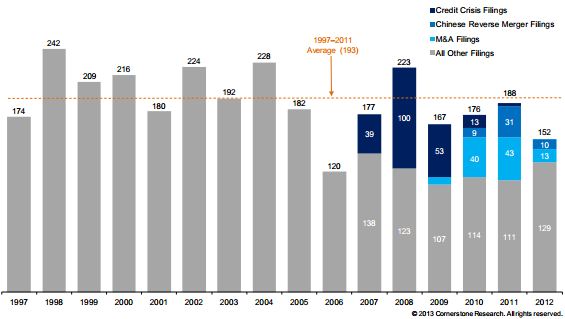TD Ameritrade Data Suggests Retail Investors Use ETFs in 'Sophisticated Ways'
(Mar 2013)
Exchange-traded funds (ETFs) are increasingly popular among retail investors. ETFs tend to have lower expense ratios than comparable mutual funds, and can be traded intraday like stock, giving them a comparable advantage that has proven attractive. The number of ETF issuers has grown, and that competition has driven down prices in what has become known in the financial press as the "ETF Fee War".
TD Ameritrade has produced an infographic that shows how their clients use ETFs, and the results...
SPIVA Scorecard Year-End 2012
(Mar 2013)
S&P Dow Jones Indices recently released their year-end 2012 report comparing the performance of actively managed mutual funds against their benchmark indices (we covered the year-end 2011 report previously). The S&P Indices Versus Active Funds (SPIVA) Scorecard once again shows that, for the most part, mutual funds tend to underperform their benchmarks:
The year 2012 marked the return of the double digit gains across all the domestic and global equity benchmark indices. The gains passive...
SEC Examination Priorities 2013
(Feb 2013)
Last week, the Securities and Exchange Commission announced their examination priorities for 2013 "to communicate with investors and registrants about areas that are perceived by the staff to have heightened risk, and to support the SEC's mission to protect investors, maintain fair, orderly, and efficient markets, and facilitate capital formation."
For those that are unfamiliar, SEC staff conducts examinations of SEC registrants through their regional offices and headquarters
to determine...
Securities Class Action Filings Decrease in 2012
(Feb 2013)
Earlier this year, Cornerstone Research released 2012 review of Securities Class Action Filings in conjunction with the Stanford Law School -- see the press release. The report notes that the number of federal securities class action filings have decreased in recent years and, in particular, has fallen nearly 20% from 2011 to 2012. For the number of filings over the past sixteen years can be found below (Figure 2 in their report).
Cornerstone attributes the majority of the decline in class...
CFTC Amendment to Rule 4.5 Survives Challenge
(Dec 2012)
Last Thursday, a Federal judge ruled on a challenge to the CFTC's February 2012 amendment to Rule 4.5 that will require mutual funds and ETFs that have sufficient non-hedging participation in derivative markets to register with the CFTC as commodity pool operators (CPOs). The CFTC defines a CPO as a "person engaged in a business similar to an investment trust or a syndicate and who solicits or accepts funds, securities, or property for the purpose of trading commodity futures contracts or...
PowerShares to List Actively Managed Downside Hedged S&P ETF
(Dec 2012)
Late last week, Invesco PowerShares filed a form N-1A registration statement with the SEC to list an exchange traded fund (ETF) with exposure to the S&P 500 with downside exposure actively hedged through VIX futures contracts. The PowerShares S&P 500 Downside Hedged Portfolio (PHDG) seeks to "achieve positive total returns in rising or falling markets that are not directly correlated to broad equity or fixed income market returns" and has annual operating expenses of about 39 basis points....
Two New Exotic Products from the CBOE
(Oct 2012)
The CBOE has begun the offering process on two new and highly innovative volatility-related products that could have broad implications for the exchange traded products market and index investing in general.
The new S&P 500 Variance Futures are futures contracts on the realized variance of the S&P 500 index. This is in contrast with VIX futures, which trade on the impliedvolatility of the S&P 500; however, according to a CBOE press release, the ability to combine the two may have motivated...
SEC Investor Bulletin on ETFs
(Aug 2012)
The SEC recently released an Investor Bulletin on ETFs which provides background information about ETFs in general and defines several terms which may be confusing to investors. ETFs can be complex and risky investments, as they allow nearly anyone to purchase portfolios which would typically only be suitable for sophisticated investors or traders.
Some commentators were not satisfied with the Bulletin, particularly its lack of new guidelines related to leveraged and inverse products. Paul...
Direxion to Close Several Leveraged ETFs
(Aug 2012)
Direxion Shares ETF Trust announced last week that -- upon recommendation of the trust's advisor Rafferty Asset Management, LLC -- nine daily leveraged and inverse Exchange Traded Funds will be liquidated and shares will no longer be open for purchase as of early next month. From the announcement,
Due to the Funds' inability to attract sufficient investment assets, Rafferty believes they cannot continue to conduct their business and operations in an economically efficient manner. As a result,...
Massachusetts Securities Regulators Fine RBC for Selling Unsuitable Leveraged and Inverse ETFs
(May 2012)
RBC Capital Markets has agreed to pay $2.9 million in restitution to Massachusetts investors related to the sale of unsuitable leveraged, inverse, and inverse-leveraged ETFs. Secretary of the Commonwealth of Massachusetts William Galvin, who has previously investigated Bank of America over warehousing of CLO assets, issued the complaint in July 2011, accusing RBC and its registered representative Michael D. Zukowski of selling these products "to clients who did not understand what these...

